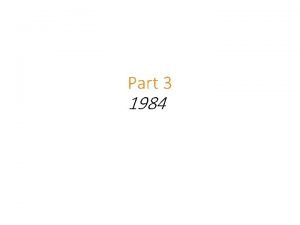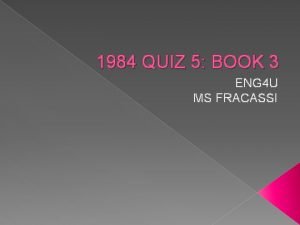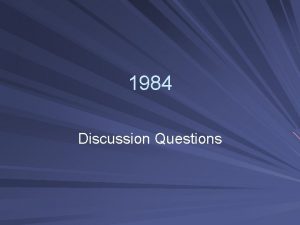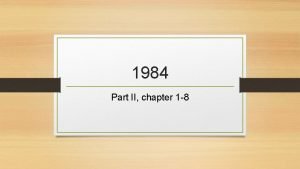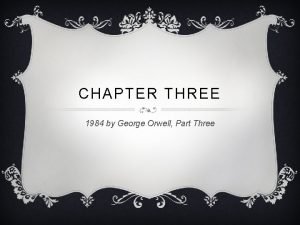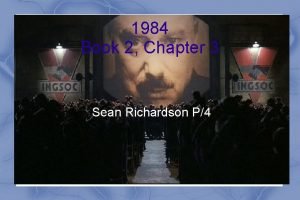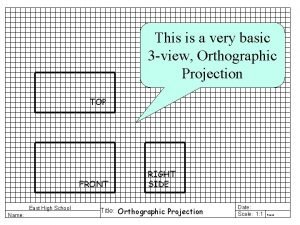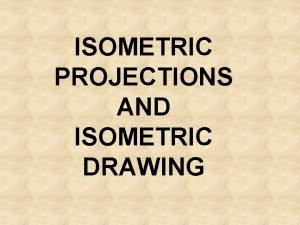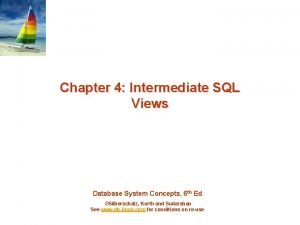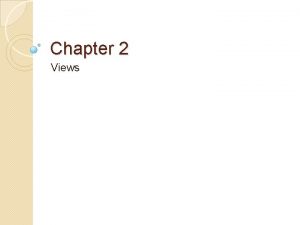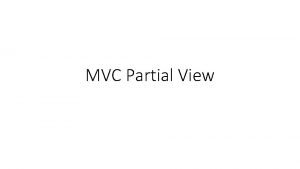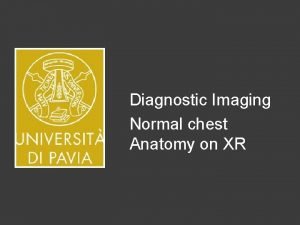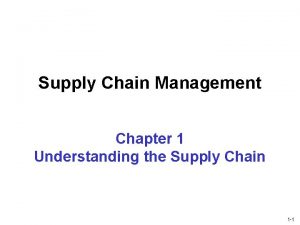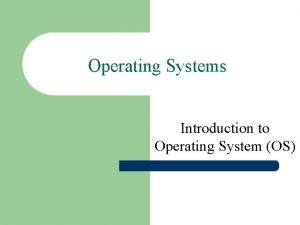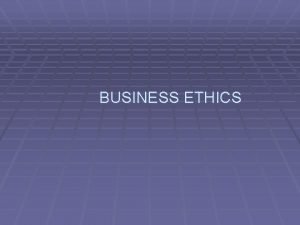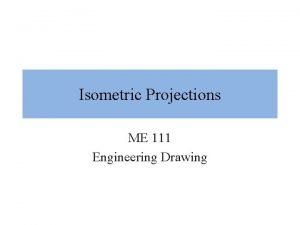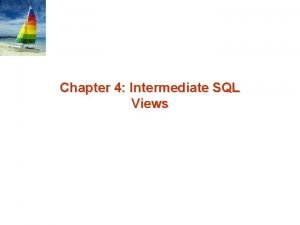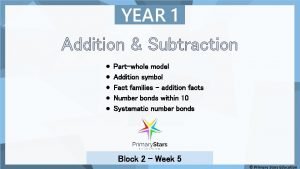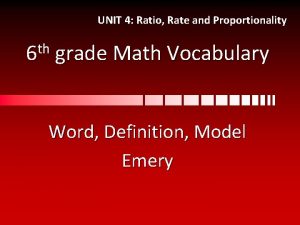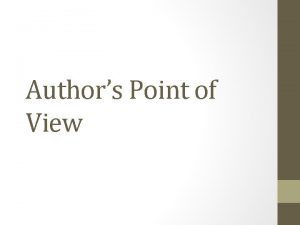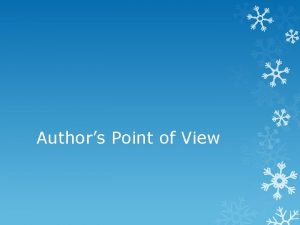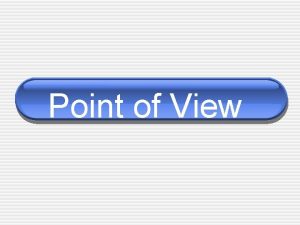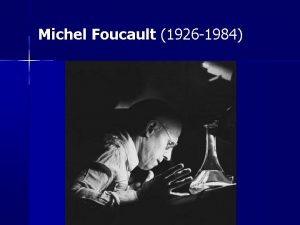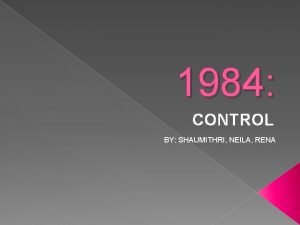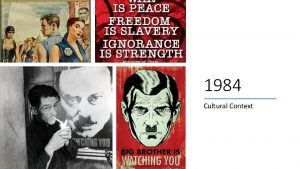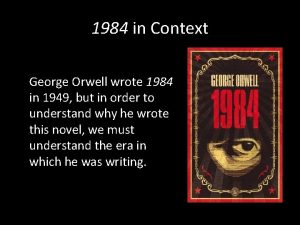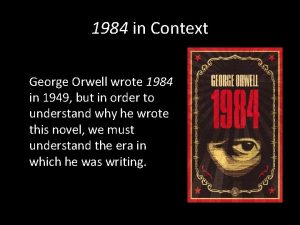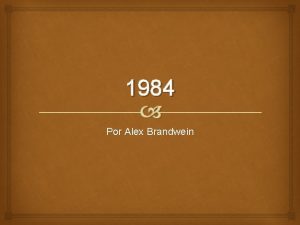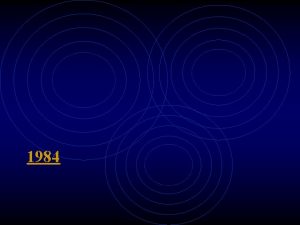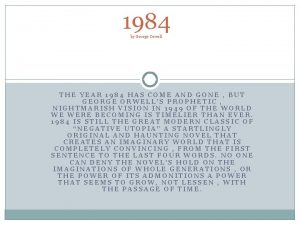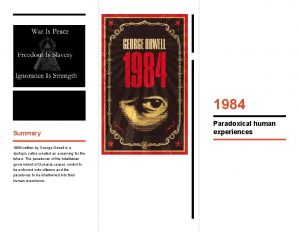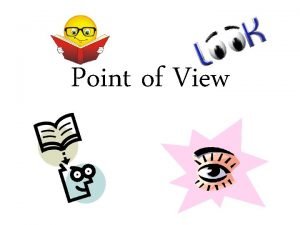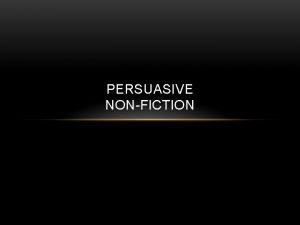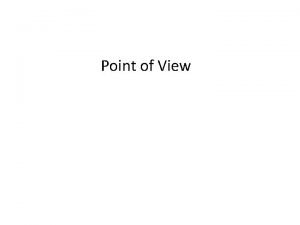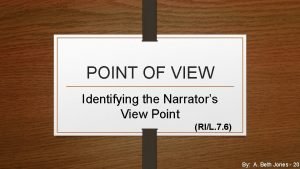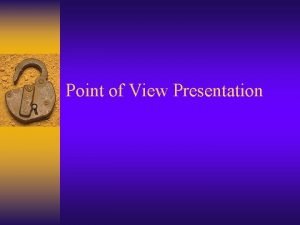Part 3 1984 Point of View This is





























- Slides: 29

Part 3 1984

Point of View • This is Winston’s story, the reader only gets information through his eyes. Why does this work? • Third person limited narrative point of view is generally used in this genre because it helps reveal both thoughts and events of the main character. • Winston Smith is every-man. By understanding Winston's story and point-of-view as every-man's story, the reader can see the scope of Orwell's message against Totalitarianism through the eyes of every average citizen in 1984.

Chapter 1 – The Ministry of Love? • Winston wakes in a high tech jail cell (telescreens) • Do you think this is Winston’s mother? (239240) • The pain of HUNGER – how long has he been there? • Knew he loved Julia like he knows math; facts but no longer feels • Wondering about O’Brien… did he make it? • Razor blade – hope for suicide weapon

Chapter 1 cont’d • 241 – “the lights would never be turned out” – alluding to place of no darkness • Winston has 6 key thoughts – What are they? (244) • Parsons – committed Thoughtcrime – grateful they caught him before he went further – BRAINWASHED to extremes; turned in by daughter, proud of her (245) – What did he do? Is there proof?

Room 101 • Fear of the unknown is greater than the room itself… prisoners would do ANYTHING but go to room 101 • Psychologically damaging: • Man offers to be killed, hung, shot, gives his family up (6 year old child) – take them; take anyone but me… • Prisoner vs. Prisoner (fights; verbal blame) • Nothing worse than physical pain? O’Brien comes in = TRAITOR • Do you think Winston subconsciously knew?

Room 101 • Why? TO CURE YOU – they don’t care about confessions, killing people, etc. They need to bring you to their side first. Complete power is key • 269 – Hollow people out, then re-fill with BB; Brain erasing and re-filling with the Party’s facts • Winston gets questions: • How’s Julia? – What does O’Brien tell him? Do you believe this? • Is BB real? – Is BB an actual person? • Is the brotherhood real? Why doesn’t O’Brien tell him?

Chapter 2 – The Interrogation • Regular beatings; in and out of consciousness; confessing to any and everything • 254 – Find out what to confess and do so • 256 – O’Brien says “for 7 years I have watched you…” – they got to him 7 years ago! Has been on Winston’s “case” for 7 years, planning EVERYTHING. Dream was put into his brain (telescreens in the night? How else? ) He is now meeting O’Brien at the place of “no darkness” • Why not just kill him? O’Brien says “I shall save you. I shall make you perfect” – 258 – need to genuinely change persecutors to the Party’s side, heart and soul

Chapter 2 1) List the number of things to which Winston confesses. 2) What does O’brien say is wrong with Winston? 3) On p. 259, Winston thinks: That was doublethink. To what is he referring. 3) What is O’brien’s view of reality which he describes to Winston? 4) According to O’brien, why has Winston been brought to the Ministry of Love? 5) On page 266 O’brien says “And above all we do not allow the dead to rise up against us. ” What does he mean by this? 6) When Winston asks why he is being tortured (p 267), O’brien says, “But we make the brain perfect before we blow it out. ” In a short paragraph, explain what he means by this. (Read all of 267 -268 to provide your answer. ) What is the significance of this chapter?

O’Brien • Early in the novel, O'Brien is developed primarily as the subject of Winston's fantasies. Despite only having seen the man a few times, Winston imagines that O'Brien, a Inner Party official, is in reality a Party discontent like him: • He felt deeply drawn to him. . . because of a secretly held belief — or perhaps not even a belief, merely a hope — that O’Brien’s political orthodoxy was not perfect. • This conviction only increases over time, and O'Brien eventually approaches him, leading him to believe that he is, in fact, a Party dissident. Winston and Julia go to his home, where they confess their heretical thoughts, and throw themselves on his mercy while asking if the rumours about the Brotherhood are true. O'Brien engages in what turns out to be an extended act of deception, convincing Winston that he is to be made part of the resistance. He even drinks to the health of the Party's Emmanuel Goldstein: • I think it is fitting that we should begin by drinking a health. To our Leader: To Emmanuel Goldstein. • This reveals the extent of O'Brien's duplicity and ruthlessness. Later, when Winston is arrested and brought in for torture (by O'Brien himself) the true nature of the Party and of O'Brien is revealed. After several lengthy torture sessions in which O'Brien reveals the true nature of the Party and of Big Brother, he offers a chilling vision of the future: • There will be no curiosity, no enjoyment of the process of life. All competing pleasures will be destroyed. But always — do not forget this, Winston — always there will be the intoxication of power, constantly increasing and constantly growing subtler. Always, at every moment, there will be thrill of victory, the sensation of trampling on an enemy who is helpless. If you want a picture of the future, imagine a boot stamping on a human face — for ever. • Like the Inner Party that he represents, he wields power for its own ends. He is highly attuned to the processes by which memory is manipulated, created, and destroyed. He is ruthless, cruel, and totally bereft of any sense of humanity. He embodies the frightening methods and logic of totalitarianism.

. Compare the representation of Winston and O’Brien in Chapter 4 and the effect of this presentation O’Brien Winston Effect Language Imagery Action Speech

Character representation • Choose a reference to O’Brien from this chapter and discuss its significance. What did it reveal about his character? • What does the character O’Brien represent? • Paragraph Response: • In reference to George Orwell describing 1984 as a warning, ‘the moral to be drawn from this nightmare dangerous situation is a simple one: Don’t let it happen. It depends on you. ’ How does the characterisation of O’Brien contribute to this warning? • • What Winston’s characterisation represent? How does his characterisation contribute to Orwell’s warning?

Totalitarian Government • George Orwell was clearly basing the totalitarian government of 1984 on the examples set by real dictators in history. • Choose the most useful method that Big Brother utilises to keep the population in line and discuss why it is the most useful in comparison to the others. • Support your argument with examples from real world population control techniques. For example, Propaganda is utilised in Oceania and in China of today to great effect for the following reasons…

Chapter 3 – O’Brien • The three stages of reintegration are… • The Party and POWER – power for their own good, power is power – power not as a means but as an end; Party becomes IMMORTAL • “The rule of the Party is forever” (274) • Slavery is Freedom = when you’re a slave of the Party, you become an entity of the Party, when your body dies you still exist as part of the Party’s idealism; never die • Nothing exists except through the mind - need for mind control

Power is… • Inflicting pain and humiliation • Tearing mind to shreds and putting back together in new shapes • Suffering World founded on HATRED: • Family erased – don’t trust anyone, child spies • Procreation a formality • Laughter – gone, except at enemy’s defeat • No art, literature, science, curiosity • Always will be an “enemy”

Theme: Power • What are the different ways that the Party obtains and maintains power in Oceania? Which is the most potent? • What does it mean to want power for power’s sake? Is this what the Party does? • What is power good for, anyway, other than to gain other things such as money, control, and even more power? • What are some of the rights confiscated altogether by the Party? • What is the most difficult for Winston to lose? • How does the Party’s propaganda indoctrinate and control thought? • How is torture regarded in 1984? What is it used for, exactly, and how would the Party’s power be weakened without it?

Discuss the following • O’Brien’s description of power as "a boot stamping on a human face […] forever" is misguided, because power is more about influence and authority than victory over resistance. Is this the Party’s fatal flaw in 1984 demonstrates that totalitarianism is a devastating political agenda, because it is necessarily dependent upon fear and physical torture. Without these elements, would the Party would have power?

• "Never again will you be capable of love, or friendship, or joy of living -- We shall squeeze you empty and then we shall fill you with ourselves" (Orwell 210). The inner party, in this case O'Brien, is made to be incredibly driven when it comes to squeezing all of the rebellion out of each individual.

Human Nature • The Party creates Human Nature (282) • Winston can’t believe it – something MUST overthrow this • Winston as The Last Man; the Party is the Inheritors – Winston is outside history; alone; non-existent • Winston looks at himself in mirror (284) – emaciated; skin and bones • He’s betrayed Julia in words – crimes admitted to, but O’Brien knows he hasn’t really betrayed her yet; he still LOVES her • O’Brien not finished yet – still some work… “in the end we shall shoot you” (hopelessness).

Chapter 4 • 1) How Winston has changed physically and mentally since he last saw O'Brien. • 2) Explain what Winston means on page 294 when he says, “They would have blown a hole in their own perfection. To die hating them, that was freedom. ” • Paragraph Response: Discuss Winston as a heroic figure? • What qualities does he have that could define him as one?

Reality Control • Once Winston begins to practice reality control, he realizes that absolutely anything can be true if he (or, more importantly, the Party) wishes it so. Reality is what he makes of it. As O'Brien explains, reality happens in the mind. • As Winston's mind becomes completely accepting of reality control, he labels thoughts such as the memories of his mother as "false memories" and completely dismisses them.

Orwell’s Warning… Winston was one of few members of Oceanian society who even remembered a time before the Revolution. Recall the things that Winston remembers before the Revolution. He is shown as one of the few members who even remembered the time before. Julia, although disgruntled with Party life, never believed in the potential for successful rebellion. What can you therefore assume would happen once the last people who remember life before the Revolution die off, and once Newspeak officially takes over for Oldspeak? What is Orwell final warning through creating this scenario?

Chapter 5 • 1) How does Winston save himself? • ‘Do it to Julia! Not me! Julia!I don’t care what you do to her. Tear her face off, strip her to the bones. Not to me! Julia! Not me!’ What does this signify in reference to theme sex, love and loyalty? • 2) In the last paragraph of the chapter, what is symbolically happening to Winston. • “Do you see that thing facing you? That is the last man” (Orwell 224). The Last Man in Europe Orwell and his publishers decided to change the name before publication.

Historical context of 1984 • “Every line of serious work that I have written since 1936 has been written directly or indirectly against totalitarianism and for democratic socialism, as I understand it” (Orwell, Why I Write 142). • Considering the historical context in which George Orwell was writing, what is the significance of theme_________? • Structure:

Orwell’s Timeless Warning • http: //vimeo. com/72997833 • representation of George Orwell's warning to the world in his book '1984'. The film features the Nineteen Eighty-Four (1984) film, BBC's George Orwell: A Life in Pictures,

Prediction… 40 years from now

Chapter 6 • 1) Where is Winston in this chapter? • 2) What a couple of things Winston can do now that he couldn’t before he was arrested? • 3) Discuss the symbolism of the chess game Winston plays. • 4) Winston says the story he has just remembered about his family is false. What does this tell you about what has happened to Winston? • 5) What, according to the last couple sentences of the book, has happened to Winston?

The ending… • "Everything was all right, the struggle was finished. He had won the victory over himself. He loved Big Brother" (Orwell 245). • What does this quote demonstrate? • Was the ending inevitable?

Oral Presentation

 Point of view 1984
Point of view 1984 1984 book 3 quiz
1984 book 3 quiz 1984 part 2 discussion questions answers
1984 part 2 discussion questions answers 1984 chapter 1 part 2
1984 chapter 1 part 2 Winston's opinion of his workplace
Winston's opinion of his workplace Part three 1984
Part three 1984 Goodthinkful 1984
Goodthinkful 1984 Orthographic view drawn directly above the front view
Orthographic view drawn directly above the front view Sectional views reveal
Sectional views reveal Revolves section
Revolves section Partial section view
Partial section view Birds eye angle
Birds eye angle Orthographic elevations
Orthographic elevations Isometric orthographic projection
Isometric orthographic projection For the view create view instructor_info as
For the view create view instructor_info as Simple view and complex view
Simple view and complex view Simple view and complex view
Simple view and complex view Simple view and complex view
Simple view and complex view Difference between view and partial view in mvc
Difference between view and partial view in mvc Anatomy chest x ray
Anatomy chest x ray Cycle view and push/pull view of supply chain
Cycle view and push/pull view of supply chain Introduction of operating system
Introduction of operating system Separatist view and integration view
Separatist view and integration view The orthographic view drawing directly above the front view
The orthographic view drawing directly above the front view Front view top view
Front view top view 3/4 isometric view
3/4 isometric view For the view create view instructor_info as
For the view create view instructor_info as Macromedia flash tools
Macromedia flash tools Part part whole addition
Part part whole addition Part to part ratio definition
Part to part ratio definition
